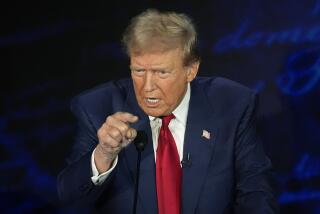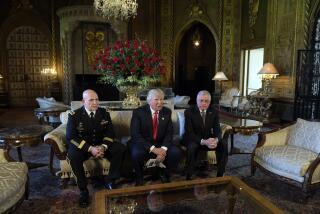On immigration and trade, Trump is making policy by gut instinct; it’s been messy
As President Trump declared last month, he’s finally “getting very close to having the Cabinet and other things that I want.”
The past week demonstrated what that means in practice — a president who has ousted most of the people who would tell him “no” and who feels freed to make decisions according to his gut, much as he did in business.
The results, now as then, are not always pretty.
Have friends who would like this newsletter? Here’s where to sign up »
IMPROVISATION ONE — SEND IN THE MILITARY
As is often the case, a tweet captured the dissonance at the heart of Trump’s message on immigration.
“Border crossings are at a still UNACCEPTABLE 46 year low,” he declared Thursday morning on Twitter.
It’s hard to turn a 46-year low into an ”unacceptable” crisis, but Trump spent the week doing his best, sending the government scrambling to improvise policies to keep up with his pronouncements.
Illegal crossings — gauged by how many people the Border Patrol apprehends — are at levels lower than any seen since the early 1970s and have been for several years. Trump and his aides have taken great pride that the number plummeted even further after his election.
That picture changed somewhat in March, however, as Noah Bierman, Joe Tanfani and David Cloud reported: The number of people caught crossing the border illegally jumped.
Experts will say that the number typically rises in the spring and that last month’s figures pretty much followed the normal pattern of recent years. None of that, however, would be likely to satisfy a president who has staked his reputation on “controlling” the border.
Homeland Security Secretary Kirstjen Nielsen dutifully declared the one-month increase a sign of a serious threat.
White House officials haven’t said exactly when Trump became aware of the new numbers, which the Homeland Security Department publicly released on Thursday. But in a series of tweets that began Sunday and extended through the week, he repeatedly returned to the subject of the border.
Trump began, as Laura King wrote, with an Easter Sunday tirade in which he suggested he would no longer make a deal on DACA, the Obama-era program that shields nearly 700,000 young immigrants from deportation.
As the week went on, he focused on a “caravan” of people traveling up through Mexico from Central America.
As Kate Linthicum reported from the scene, the caravan, which attracted much attention from Fox News and its loyal viewer in the White House, consisted of about 1,000 bedraggled people, mostly from Honduras, stuck in southern Mexico, more than 1,500 miles from the border, with little prospect of ever reaching the U.S.
To Trump, however, they posed at least a political threat — he’s already been under fire from conservative allies for failing to get Congress to appropriate money to build his much-vaunted border wall.
His response came on Tuesday, when he surprised advisers — and blindsided the Pentagon — by declaring that “until we can have a wall and proper security, we are going to be guarding our border with our military. That’s a big step.”
Officials spent the next 48 hours frantically improvising — in the end, turning Trump’s bold words into much more pallid deeds. They gave the president a proclamation to sign which authorized officials to negotiate with governors over sending National Guard units to the border, much as Presidents George W. Bush and Barack Obama did in their tenures.
Trump’s deployment of the Guard has a couple of commonalities with the decisions by his two predecessors — politics, for one. Sending in the military sounds tough even if it doesn’t change much on the ground.
Under long-standing U.S. law, military personnel are not allowed to apprehend anyone. They provide support to the Border Patrol, which in most cases has meant helping with surveillance. It’s a far cry from “guarding our border with our military.”
As Cathy Decker wrote, Trump’s renewed focus on immigration highlights an issue on which both parties think they have a political advantage. Paradoxically, both may be correct, depending on which part of the country one looks at.
The main difference with the Bush- and Obama-era deployments was Trump’s total lack of advance planning. Pentagon officials this week could not say how many Guard troops would go to the border, what they would do or even if they would be armed. According to Mexican officials, Nielsen assured them the troops would not be armed.
By Thursday night, none of the governors had yet made any firm commitment, although at least some likely will as soon as Washington commits to pay the full cost.
IMPROVISATION TWO — TRADE WAR
On Tuesday, following directives Trump issued last month, U.S. Trade Representative Robert Lighthizer published a lengthy list of some $50 billion in Chinese products on which the U.S. plans to impose a 25% tariff.
China quickly responded with a list of U.S. imports that it would tax, matching the size of the U.S. list.
As Don Lee and Jonathan Kaiman wrote, the question quickly became “who would blink first.”
Analysts see two scenarios:
In one, the bluster leads both sides to negotiate a settlement that would avoid a trade war and, perhaps, put some limits on Beijing’s practice of forcing foreign companies to turn over technology secrets in order to get access to Chinese markets. The tariffs don’t actually take effect for months, giving plenty of time for talks.
The more pessimistic scenario is that neither side will be willing to make concessions and that a full-scale trade war will begin to damage the economy.
As the week went along, the administration sent conflicting signals.
Trump’s economic advisor, Larry Kudlow, sought to reassure jittery investors that the tariffs might never take effect, calling the exchange of threats the “early stages of a process” of negotiations that will end with “a pot of gold.”
Trump, by contrast, tweeted that the U.S. “can’t lose” a trade war.
Many analysts believe the opposite — that Chinese President Xi Jinping has the stronger hand. Xi doesn’t have to worry about running for reelection; Trump needs his help in negotiations over North Korea; and Trump’s record so far has indicated that in the interest of declaring a victory, he’ll sometimes settle for very small concessions.
Perhaps to counter that impression, Trump keeps escalating. Thursday night, he issued a statement telling the trade representative to “consider” adding an additional $100 billion in Chinese goods to the tariff list.
WILL KOREA BE IMPROVISATION THREE?
Many foreign policy experts fear Trump’s off-the-cuff approach will raise the risk of failure when he meets with North Korean leader Kim Jong-un.
As Tracy Wilkinson reported, U.S. officials are urgently starting to plan for a summit meeting that’s supposed to take place next month, even though the North Koreans haven’t officially said they’ll take part, and the two sides haven’t yet set a time or a place.
The fear in U.S. foreign policy circles is that Trump will arrive unprepared and make ill-considered concessions to Kim.
“This is a president who rejects the notion of history, of knowledge,” but prefers to rely only on his “capacity to feel the moment and use his intuition,” said Christopher Hill, a former senior U.S. diplomat who helped lead the last round of nuclear negotiations with North Korea.
“That is not a recipe for success.”
ANOTHER CABINET MEMBER ON THE BRINK
Few Trump administration officials have carried out Trump’s agenda as aggressively as EPA administrator Scott Pruitt.
The former Oklahoma attorney general has moved to dismantle a wide range of environmental regulations. He has also stepped into a series of ethical swamps that have left him struggling to hold onto his job, Evan Halper reported.
The list of problems includes repeated use of first-class travel (his supporters claim security concerns justify it); a below-market deal to rent a room from the wife of an influential Washington lobbyist; skirting rules to give big raises to favored aides; and shoving aside EPA personnel who raised questions about his expenditures.
As Halper noted, the saga also includes the sort of soap-opera twists that provide a unique odor to Trump-era personnel intrigues:
One of Pruitt’s longtime top aides, until she resigned last week, was a lawyer named Samantha Dravis. Last year, she dated Rob Porter, who, at the time, held a powerful, if largely anonymous, White House post.
The two broke up last fall after Porter started a romance with Hope Hicks, Trump’s aide and communications director until recently. Dravis then told Don McGahn, the White House counsel, about accusations that Porter had abused his two former wives, Colby Holderness and Jennifer Willoughby.
After those allegations became public, Porter lost his job. But while Porter and Dravis were dating, Porter learned a lot about Pruitt. Reportedly, he’s getting revenge by acting as the source for some of the stories disclosing Pruitt’s alleged misconduct.
A SHIELD FOR OFFICERS
Improper shootings of civilians by police has been a major public concern in recent years, but the Supreme Court has made suing officers in federal court almost impossible.
This week, over dissents from Justices Sonia Sotomayor and Ruth Bader Ginsburg, the court reinforced the legal barriers to suing officers, David Savage reported.
The legal shield, known as “qualified immunity,” has gotten increasing criticism not only from the left, but also from some influential libertarian voices on the right. But so far, the majority of the court seems unmoved.
REVIVING A CANARD
Speaking in West Virginia on Thursday, Trump revived his false claim that “millions” of people voted illegally in California. It’s another example of the president feeling increasingly free to say, or do, whatever comes to his mind.
LOGISTICS
That wraps up this week. My colleague Christina Bellantoni will be back Monday with the weekday edition of Essential Politics. Until then, keep track of all the developments in national politics and the Trump administration with our Essential Washington blog, at our Politics page and on Twitter @latimespolitics.
Send your comments, suggestions and news tips to politics@latimes.com.
If you like this newsletter, tell your friends to sign up.
More to Read
Get the L.A. Times Politics newsletter
Deeply reported insights into legislation, politics and policy from Sacramento, Washington and beyond. In your inbox three times per week.
You may occasionally receive promotional content from the Los Angeles Times.











